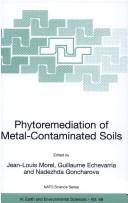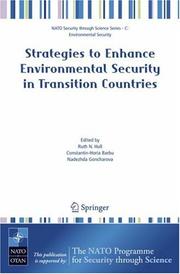| Listing 1 - 7 of 7 |
Sort by
|
Digital
ISBN: 9781402044762 Year: 2006 Publisher: Dordrecht Springer
Abstract | Keywords | Export | Availability | Bookmark
 Loading...
Loading...Choose an application
- Reference Manager
- EndNote
- RefWorks (Direct export to RefWorks)
Nature protection --- Hygiene. Public health. Protection --- Radiotherapy. Isotope therapy --- Social medicine --- Air pollution. Air purification --- Environmental protection. Environmental technology --- Computer. Automation --- ecotoxicologie --- stralingshygiëne --- farmacologie --- informatica --- milieuhygiëne --- luchtverontreiniging --- milieuzorg --- milieutechnologie --- milieubeheer --- milieuanalyse

ISBN: 9781402046889 Year: 2006 Publisher: Dordrecht Springer
Abstract | Keywords | Export | Availability | Bookmark
 Loading...
Loading...Choose an application
- Reference Manager
- EndNote
- RefWorks (Direct export to RefWorks)
Science --- Hygiene. Public health. Protection --- Radiotherapy. Isotope therapy --- Environmental protection. Environmental technology --- Pedology --- Biotechnology --- bodemkunde --- stralingshygiëne --- bodembescherming --- farmacologie --- wetenschap --- biotechnologie --- milieuzorg --- wetenschappen --- milieutechnologie --- milieubeheer --- milieuanalyse
Book
ISBN: 9781402044762 Year: 2006 Publisher: Dordrecht Springer Netherlands
Abstract | Keywords | Export | Availability | Bookmark
 Loading...
Loading...Choose an application
- Reference Manager
- EndNote
- RefWorks (Direct export to RefWorks)
The science of ecotoxicology and the practice of ecological risk assessment are evolving rapidly. Ecotoxicology as a subject area came into prominence in the 1960s after the publication of Rachel Carson's book on the impact of pesticides on the environment. The rise of public and scientific concern for the effects of chemical pollutants on the environment in the 1960s and 1970s led to the development of the discipline of ecotoxicology, a science that takes into account the effects of chemicals in the context of ecology. Until the early 1980s, in spite of public concern and interest among scientists, the assessment of ecological risks associated with natural or synthetic pollutants was not considered a priority issue by most government. However, as the years passed, a better understanding of the importance of ecotoxicology emerged and with it, in some countries, the progressive formalization of an ecological risk assessment process. Ecological risk assessment is a conceptual tool for organizing and analyzing data and information to evaluate the likelihood that one or more stressors are causing or will cause adverse ecological effects. Ecological risk assessment allows risk managers to consider available scientific information when selecting a course of action, in addition to other factors that may affect their decision (e. g. , social, legal, political, or economic). Ecological risk assessment includes three phases (problem formulation, analysis, and risk characterization).
Nature protection --- Hygiene. Public health. Protection --- Radiotherapy. Isotope therapy --- Social medicine --- Air pollution. Air purification --- Environmental protection. Environmental technology --- Computer. Automation --- ecotoxicologie --- stralingshygiëne --- farmacologie --- informatica --- milieuhygiëne --- luchtverontreiniging --- milieuzorg --- milieutechnologie --- milieubeheer --- milieuanalyse
Digital
ISBN: 9781402059964 Year: 2007 Publisher: Dordrecht Springer
Abstract | Keywords | Export | Availability | Bookmark
 Loading...
Loading...Choose an application
- Reference Manager
- EndNote
- RefWorks (Direct export to RefWorks)
Environmental protection. Environmental technology --- milieubeleid --- milieuzorg --- milieubeheer --- milieuanalyse
Book
ISBN: 9781402059964 Year: 2007 Publisher: Dordrecht Springer Netherlands
Abstract | Keywords | Export | Availability | Bookmark
 Loading...
Loading...Choose an application
- Reference Manager
- EndNote
- RefWorks (Direct export to RefWorks)
It is the goal of environmental security to protect people from the short- and long-term ravages of nature, man-made threats and deterioration of the natural environment. Environmental security includes activities related to pollution prevention, environmental conservation, compliance with regulations and environmental restoration. It is a challenge for transition countries to support all of these activities, due to limited resources, competing priorities and the fact that most environmental regulations, assessment methods and procedures, and restoration techniques were developed in countries where resources were not limited. This volume presents the main environmental security challenges facing transition countries, as well as practical methods and approaches for addressing them. These approaches are equally applicable to all countries. The four basic topics this volume addresses are (I) Introduction to Environmental Security Challenges (II) Strategies, Methods and Approaches for Addressing these Challenges (III) Lessons Learned as Illustrated via Research and Case Studies (IV) Issues Related to Metals in the Environment. The final chapter of the book is a summary of the discussions and working group sessions, entitled "Environmental Security in Transition Countries: Knowledge Gaps, Hurdles and Effective Strategies to Address Them".
Environmental protection. Environmental technology --- milieubeleid --- milieuzorg --- milieubeheer --- milieuanalyse

ISBN: 9781402059940 1402059949 1402059957 9786610853564 1280853565 1402059965 Year: 2007 Publisher: Dordrecht, The Netherlands : Springer,
Abstract | Keywords | Export | Availability | Bookmark
 Loading...
Loading...Choose an application
- Reference Manager
- EndNote
- RefWorks (Direct export to RefWorks)
It is the goal of environmental security to protect people from the short- and long-term ravages of nature, man-made threats and deterioration of the natural environment. Environmental security includes activities related to pollution prevention, environmental conservation, compliance with regulations and environmental restoration. It is a challenge for transition countries to support all of these activities, due to limited resources, competing priorities and the fact that most environmental regulations, assessment methods and procedures, and restoration techniques were developed in countries where resources were not limited. This volume presents the main environmental security challenges facing transition countries, as well as practical methods and approaches for addressing them. These approaches are equally applicable to all countries. The four basic topics this volume addresses are (I) Introduction to Environmental Security Challenges (II) Strategies, Methods and Approaches for Addressing these Challenges (III) Lessons Learned as Illustrated via Research and Case Studies (IV) Issues Related to Metals in the Environment. The final chapter of the book is a summary of the discussions and working group sessions, entitled "Environmental Security in Transition Countries: Knowledge Gaps, Hurdles and Effective Strategies to Address Them".
Environmental management --- Environmental policy --- Security, International --- Congresses.. --- Congresses. --- Environmental aspects --- Environmental management -- Europe, Central -- Congresses. --- Environmental management -- Europe, Eastern -- Congresses. --- Environmental management -- Former Soviet republics -- Congresses. --- Environmental policy -- Europe, Central -- Congresses. --- Environmental policy -- Europe, Eastern -- Congresses. --- Environmental policy -- Former Soviet republics -- Congresses. --- Security, International -- Environmental aspects -- Congresses. --- Earth & Environmental Sciences --- Environmental Sciences --- Environmental stewardship --- Stewardship, Environmental --- Collective security --- International security --- Environment and state --- Environmental control --- Environmental protection --- Environmental quality --- State and environment --- Government policy --- Environment. --- Environmental management. --- Ecotoxicology. --- Environmental Management. --- International relations --- Disarmament --- International organization --- Peace --- Environmental auditing --- Environmental sciences --- Management --- Environmental toxicology. --- Ecotoxicology --- Pollutants --- Pollution --- Environmental health --- Toxicology

ISBN: 9781402046889 1402046863 9781402046865 1402046871 9786610612826 1280612827 140204688X Year: 2006 Volume: v. 68 Publisher: Dordrecht : Springer Netherlands : Imprint: Springer,
Abstract | Keywords | Export | Availability | Bookmark
 Loading...
Loading...Choose an application
- Reference Manager
- EndNote
- RefWorks (Direct export to RefWorks)
Phytoremediation, the use of plants to remediate environmental media, is being pursued as a new approach for the cleanup of contaminated soils and waters, including groundwater. Plant-assisted bioremediation, sometimes referred to as a type of phytoremediation, involves the interaction of plant roots and the microorganisms associated with these root systems to re- diate soils containing elevated concentrations of organic compounds. These techniques could provide cost-effective methods of remediating soils and groundwater contaminated with metals, radionuclides, and various types of organics, with fewer secondary wastes and less environmental impact than would be generated using traditional remediation methods. All plants extract necessary nutrients, including metals, from their soil and water environments. Some plants, called hyperaccumulators, have the ability to store large amounts of metals, even some metals that do not appear to be required for plant functioning. In addition, plants can take up various organic chemicals from environmental media and degrade or otherwise process them for use in their physiological processes. Phytoremediation technologies are in the early stages of development, with laboratory research and limited field trials being conducted to determine processes and refine methods. Additional research, including genetic engineering, is being conducted to improve the natural capabilities of plants to perform remediation functions and to investigate other plants with potential phytoremediation applications. Large areas in Western and Eastern countries are polluted with heavy metals and radionuclides in natural, rural, urban or industrial areas.
milieutechnologie --- milieuanalyse --- bodembescherming --- Science --- Pedology --- biotechnologie --- wetenschappen --- milieubeheer --- stralingshygiëne --- Biotechnology --- Radiotherapy. Isotope therapy --- bodemkunde --- Hygiene. Public health. Protection --- milieuzorg --- Environmental protection. Environmental technology --- wetenschap --- Soil remediation --- Soil pollution --- Phytoremediation --- Sols --- Phytorestauration --- Congresses. --- Congresses --- Décontamination --- Congrès --- Pollution --- EPUB-LIV-FT LIVCHIMI SPRINGER-B --- Biotechnology. --- Environmental protection. --- Environmental toxicology. --- Soil conservation. --- Effects of Radiation/Radiation Protection. --- Ecotoxicology. --- Soil Science & Conservation. --- Environmental Engineering/Biotechnology. --- Science, Humanities and Social Sciences, multidisciplinary. --- Conservation of soil --- Erosion control, Soil --- Soil erosion --- Soil erosion control --- Soils --- Agricultural conservation --- Soil management --- Ecotoxicology --- Pollutants --- Environmental health --- Toxicology --- Environmental quality management --- Protection of environment --- Environmental sciences --- Applied ecology --- Environmental engineering --- Environmental policy --- Environmental quality --- Chemical engineering --- Genetic engineering --- Control --- Prevention --- Conservation --- Radiation protection. --- Radiation—Safety measures. --- Soil science. --- Environmental engineering. --- Radiation monitoring --- Radiation protection --- Environmental control --- Environmental effects --- Environmental stresses --- Engineering --- Environmental protection --- Sustainable engineering --- Pedology (Soil science) --- Agriculture --- Earth sciences --- Metal contaminated soils --- NATO
| Listing 1 - 7 of 7 |
Sort by
|

 Search
Search Feedback
Feedback About
About Help
Help News
News